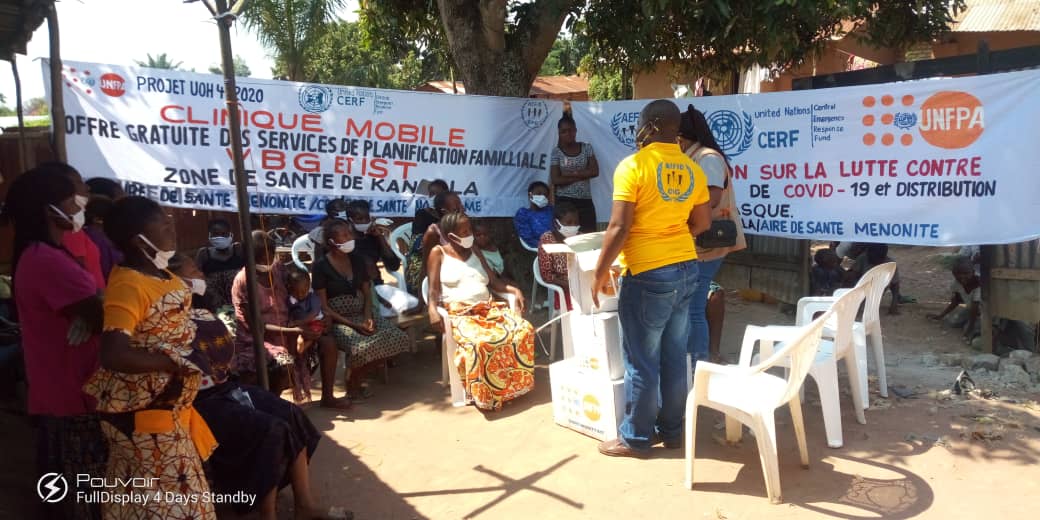While deploying Emergency Humanitarian Response teams to six (6) provinces of the Democratic Republic of the Congo (DRC) most affected by the prolonged and complex humanitarian crisis , the Humanitarian Coordinator for UNFPA-DRC country office, Dr. Polycarpe Takou was firm: "We must perform better than last year, we must attend to the distress call from the people most left behind and ensure in line with our mandate, that all women and girls are relieved of the difficulties in accessing sexual and reproductive health, and rights including the prevention and management of Gender-Based Violence." Barely 17 days after the approval of the Central Emergency Response Fund (CERF) UF project by OCHA, Dr. Takou's words have since been translated into actions, with the project offices of Tshikapa and Kananga simultaneously embarking on the training of community health workers with the aim of promoting "Access to sexual and reproductive rights for women and girls in conflict-affected communities." Twice a year, CERF Secretariat allocates grants to certain countries prioritizing main sectors such as the severity of humanitarian needs, risk, and vulnerability of the affected populations.
In 2020, UNFPA-DRC will strengthen the technical skills of medical staff working in 33 basic health facilities, and 11 General Referral Hospitals located and ensure the strengthening of maternal and newborn health services in the targeted areas located in 11 health zones of Ituri, Tanganyika, Kasaï Central, Kasaï, North Kivu, and South Kivu provinces.
As such, 6,000 cases of sexually transmitted infections (STI) are projected to be adequately managed including the free distribution of 600,000 condoms to desired users, not to mention adolescents and young people.
This year also, UNFPA has deployed a new cohort of humanitarian midwives in the 11 health zones to ensure family planning and quality multisectoral care and services for 2,465 survivors of sexual and gender-based violence alongside some 22,700 women who receive essential quality antenatal care and assistance at child birth from qualified personnel. Some 1,200 mothers are expected to benefit from free caesarian sections while 300 cases of obstetric fistula will receive free surgical repair and socio economic reintegration into their families and communities
As in the Kasaï, the community health workers identified in Ituri and North Kivu are already recycled on rapid detection of danger signs in pregnant women, standard precautions for infection control, referral and counter-referral concepts, management of STI / HIV and the use of modern contraceptive methods. To this end, more than 200 community health workers are identified in each province to raise awareness and help communities to take ownership of the humanitarian dimension of the project hence enable the sustainability of results paving the way for community development, during and after the nine months of CERF UF 2020 implementation. Moreover, the project implementing partners in Ituri distinguished themselves by accelerating the training on clinical management of rape cases in the heat of ongoing inter-community conflicts. For the six provinces, more than 1,200 providers and community health workers will benefit from various training courses in Minimum Initial Service Package in reproductive health in crises; emergency obstetric and newborn care (SONU), sexually transmitted infections (STIs), family planning, prevention of diseases and risks of exposure to various agents (carcinogenic, mutagenic, toxic for the reproductive system) and the fundamentals for management of GBV cases.
In addition, the community health workers trained through the CERF project will conduct awareness-raising activities in line with the campaign to end Gender-Based Violence (GBV) and ensure human security for the humanitarian midwives deployed by UNFPA within the framework of this program through facilitating their social integration and smooth exercise of their duty in the host communities with confidence, diligence, and efficiency.

The project’s free maternity and family planning services are a real boost for the health zones of Bunia, Drodro and Fataki (Ituri); Masisi and Mweso (North Kivu); Fizi and Minova (South Kivu); Kalemie and Kiambi (Tanganyika), Kalomba (central Kasai); and Kamonia (Kasai). More than one million beneficiaries, particularly Congolese forcefully expelled from Angola, and the internally displaced persons(IDP) in refugee camps will experience relief from their ailments and anxieties and receive dignity kits to mitigate their vulnerability. Seven (7) implementing partners, notably Caritas Bunia, SOFEPADI, Hope in Action, Médecins d'Afrique (MDA), ADRA, Caritas Kananga and AEFID have been hired to provide technical expertise to the sectoral ministries (Health and Gender) to ensure the achievement of results while the deployed midwives will feed Kinshasa country office with data and statistics from the field site. Finally, the Kinshasa Saint Joseph Hospital’s surgical team will tour eleven General Hospitals to train and strengthen the capabilities of their local peers while repairing identified cases of obstetric fistulas before their socio-economic reintegration will be completed by the NGO partners mentioned above.
By Théophane Patinvoh (Goma) with the Contribution of NAKIKULULA KIKUNI Joseph-Youny (Bunia), Dr Alphonse Matondo (Kananga), Dr Mayatezulua Salanga(Kalemie) and Dr Léonie Atimango-Marini (Tshikapa)

